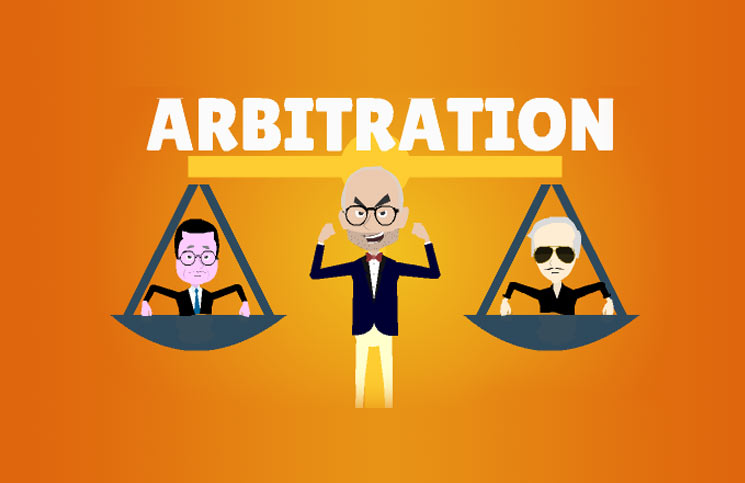- Home
- About Us
- Practice Areas
- NRI Legal Services
- Matrimonial and Family Laws
- Payment Recovery
- ADR
- Cheque Bounce
- Consumer Law
- Immigration Law
- Criminal Law
- Civil Law
- Motor Accident Claims
- Labour & Employment Dispute
- Property Dispute
- Taxation, Direct and Indirect
- MSME
- Intellectual Property
- Finance & Banking
- Registration & Documentation
- Insolvency & Bankruptcy Code
- Service Law
- Merger & Acquisition
- Legal Metrology
- Blogs
Contact Info

Advantages and Disadvantages of Arbitration in India

Advantages and Disadvantages of Arbitration in India
Advantages and Disadvantages of Arbitration in India
Arbitration has emerged as a popular alternative to traditional litigation for resolving disputes. It offers parties involved in a legal dispute the opportunity to settle their differences outside of the courtroom, with the help of a neutral third party known as an arbitrator, who in most cases is a retired judge. In this article, we will explore the advantages and disadvantages of arbitration as a method of dispute resolution.
Advantages of Arbitration
1. Speed and Efficiency
One of the primary advantages of arbitration is its speed and efficiency. Unlike litigation, which can often take years to reach a resolution, alternative dispute resolution allows parties to resolve their disputes in a more timely manner. The process is typically less formal and streamlined, resulting in quicker decisions. As per Section 29A, arbitral awards should be made within twelve months of completing pleadings. This timeline can be extended by six months with the consent of the parties, setting the upper limit at 18 months.
2. Flexibility
Arbitration provides parties with the flexibility to choose their own arbitrator and decide on the procedural rules that will govern the process. This allows parties to select an arbitrator with expertise in the relevant area of law and tailor the process to suit their specific needs. If parties are unable to mutually agree on the appointment of an arbitrator, any party may approach the High Court under Section 11 of the Arbitration & Conciliation Act for the appointment of an arbitrator.
3. Confidentiality
Unlike court proceedings, which are generally open to the public, arbitration offers a greater level of confidentiality. Parties can keep their disputes private, safeguarding sensitive information from public disclosure.
4. Finality
Arbitration provides a sense of finality to the resolution of disputes. The limited grounds available for challenging an award passed by an arbitrator ensure that disputes are concluded, unlike trial decisions that may be subject to multiple appeals, new trials, and further appeals.
Disadvantages of Arbitration
1. Limited Judicial Review
A significant disadvantage of arbitration is the limited judicial review available for arbitrator awards. Unlike court judgments, which can be appealed to higher courts, arbitrator awards are generally final and binding. The scope for modifying or setting aside an award is minimal, which can be problematic if a party believes the arbitrator erred in interpreting the law, applying the facts, or acted with bias.
2. Cost of Arbitration
Although arbitration was initially designed to be a cost-effective alternative to litigation, it often proves otherwise. Parties are responsible for the arbitrator’s fees, as specified in the Fourth Schedule of the Arbitration & Conciliation Act. Additionally, costs such as venue bookings, stenographers, secretarial expenses, and legal representation can significantly increase the overall expense of the process.
3. Limited Precedent
Arbitration awards do not create binding legal precedent, unlike court judgments. This means that decisions in one arbitration case are not necessarily applicable to future cases involving similar issues. As a result, the development of consistent legal principles and guidance may be limited in the context of alternative dispute resolution.
4. Lack of Public Scrutiny
While confidentiality can be an advantage, it also leads to a lack of public scrutiny. The opacity of the arbitration process can raise concerns about fairness and accountability. Decisions are not subjected to the same level of public oversight as court judgments, which may undermine trust in the process, especially when arbitrators are predominantly retired judges.
Conclusion
Arbitration offers a mix of advantages and disadvantages. When considering arbitration as a method of dispute resolution, parties must carefully weigh these factors to make an informed decision based on their specific circumstances.
How Anuj Dewan & Associates Can Assist
Anuj Dewan & Associates specializes in filing and defending claims in arbitration proceedings, leveraging extensive experience in handling arbitrations conducted in Punjab, Haryana, Chandigarh, and New Delhi. The firm adopts a strategic approach to align case handling with the client’s commercial interests while ensuring cost-effective and timely resolution of issues.
The firm’s services include:
- Assisting in the appointment of arbitrators under Section 11.
- Securing interim reliefs under Sections 9 and 17.
- Challenging awards under Section 34 of the Arbitration & Conciliation Act.
With a focus on delivering efficient and effective outcomes, Anuj Dewan & Associates is a trusted partner for clients navigating the complexities of arbitration and mediation.
Links
Other Links
Copyright @2024 Zeicle Tech.All Rights Reserved
